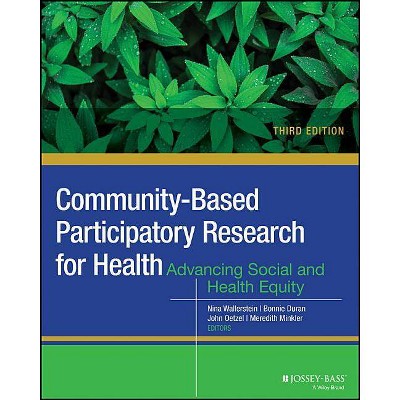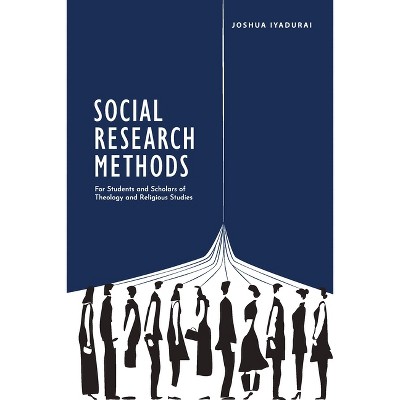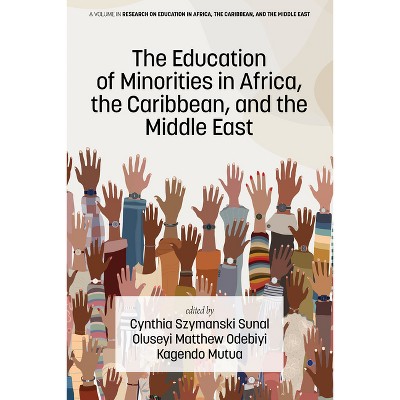Sponsored

Black Participatory Research - by Elizabeth R Drame & Decoteau J Irby (Hardcover)
In Stock
Sponsored
About this item
Highlights
- About the Author: Elizabeth R. Drame is Associate Professor in the Department of Exceptional Education at the University of Wisconsin-Milwaukee, USA.
- 205 Pages
- Education, Multicultural Education
Description
From the Back Cover
Black Participatory Research explores research partnerships that disrupt inequality, create change, and empower racially marginalized communities. Through presenting a series of co-reflections from professional and community researchers in different locations, this book explores the conflicts and tensions that emerge when professional interests, class and socio-economic statuses, age, geography, and cultural and language differences emerge alongside racial identity as central ways of seeing and being ourselves. Through the investigations of black researchers who collaborated in participatory research projects in post-Katrina New Orleans, USA the greater Philadelphia-New Jersey-Delaware region in the northeastern USA, and Senegal, West Africa, this book offers candid reflections of how shared identity, experiences, and differences shape the nature and process of participatory research.
Review Quotes
Review on proposal + 4 sample chapters by Michelle Fine, Professor, City University of New York, USA
This volume seeks to fill an important gap in the literature on participatory action research by attending particularly to the complex dynamics of Black researchers working with/in/alongside Black communities. Even more intriguing, the volume is situated around three key case studies, in Senegal, Philadelphia/Delaware and New Orleans, all sites of colonial and corporate reach, disinvestment and deep historic racism and struggle. There have been many books and chapters written about PAR projects on/in Black communities; what is outstanding, unique and promises to be most provocative about this project is the critical commitment to (a) reflexivity within and across Black researchers and participants; (b) honest dialogue about the knotty relations of universities and communities, and (c) explicit attention to intersectionality and the delicate dance of power that occurs within community based research.
Four distinct features of the volume suggest enormous promise and wide readership:
Critical reflexivity within Black-Black research relationships
Deep local ethnographies in communities that are at once 'sexy' destinations for tourists/investors, and deeply disinvested by the state and federal economy
Timely attention to university-community relations just at a moment when the colonial histories of universities 'strip mining' the knowledge of communities are being called to question,
And
Critical inquiry into the politics and praxis of schooling at times of privatization and radical transformation of public k-12 and higher education especially in post-Katrina New Orleans and Philadelphia.
I am also quite encouraged by the organization of the volume: by site and then distinct voices within site. The inclusion of cautionary tales, power dynamics, moments of racial solidarity and splitting, renders this an important text.
From the materials sent I would encourage Palgrave to pursue this volume. I believe it will have readership in undergraduate, graduate and community courses on participatory methods, inter-group and intra-group relations, k - 12 education, higher education, service learning and courses on race/ethnicity and the African(a) diaspora.
I also have some questions/thoughts provoked by the volume that the writers and authors may want to consider. I list those below.
Framing:
I very much appreciate the complexity of both the opening and closing chapters. While I am of course not very familiar with the three sites (although I very much look forward to reading the final volume)_ it seems as though it would be important to situate this book within three distinct, and intersecting literatures
First there is the growing literature on community based research ethics, practices, service learning, public scholarship and participatory action research. AT base, these are studies conducted in that lineage.
Second there is a growing question of the precarity, role and function of the university in public life in terms of research 'of use, ' relations with community and whether or not the university as we have known it is a sustainable design.
Third there is the literature on 'race', strategic essentialisms and within group conflict/solidarities.
This volume IS A FIRST in bringing these questions of university structure, community based research and the politics of race/white supremacy and inequality gaps, directly into conversation. These writers will be extending the work of Patricia Hill Collins who writes on the outsider into the field of community based research.
Conclusions:
Again, I obviously haven't read the book. But the following conceptual areas seem significant for analysis in the conclusion of the book:
Black racial solidarities in research practice and the haunting threats of power and intersectionality
The long painful history of universities and communities of color now engaged by Black researchers (see Linda Tuhiwai Smith on Maori researchers working with Maori communities in New Zealand)
There may need to be an unpacking of the possibilities and limits of 'strategic essentialism' built into the notion of Black racial solidarities and what happens when the person who holds the purse strings AND the pen is also Black. How does class and institutional privilege threaten Black solidarity? What are the possible land mines of epistemological violence and representation in these projects?
The remarkable need for and urgency of Black solidarities between university and community at this moment in time when communities and higher education are under siege from neoliberal forces and push for privatization.
And I would love to see some writing on what we learn from each site and from the knowledge produced across sites about race and racism, dispossession and resistance, despair and hope, and the debt of the university.
I recommend this volume with no reservations and great enthusiasm. For the conclusion it might be useful to go back to DuBois' Philadelphia Negro on the dilemmas of a Black man studying the Black community (hired to address 'the Negro problem'). Linda Tuhiwai Smith's book on Decolonizing Knowledges, particularly how Maori communities respond to Maori researchers; Gloria Anzaldua's writings developed by Maria Elena Torre on research that reflects nos-otras; Patricia Hill Collins' writings on the insider within; Michelle Fine and Jessica Ruglis' writings on circuits of dispossession and resistance, and the struggle to write critically across sites of resistance while still honoring the stubborn particulars within each site.
The complexity of edited volumes, as I have encountered, is making sure that the rhythm, commitments and readability of the chapters are comparable across writers, sites and the full text. This is a large editing commitment, particularly when working with people trained/engaged in distinct fields. It would be useful for the editors to explicate how they will take up the work of editing in ways that are respectful of 'site' and standpoint differences and yet retain an aesthetic 'jazz' and lively writing across all the chapters. I love the commitment to inclusion of multiply situated writers/voices but/and know from experience that vibrant and diverse voices are often compelling to hear, but not always as compelling to read. I say this with respect for the project, but much experience with the complexities and delicacies of this balance.
About the Author
Elizabeth R. Drame is Associate Professor in the Department of Exceptional Education at the University of Wisconsin-Milwaukee, USA. Decoteau J. Irby is Assistant Professor in the Department of Educational Policy Studies, University of Illinois at Chicago--College of Education, USA










